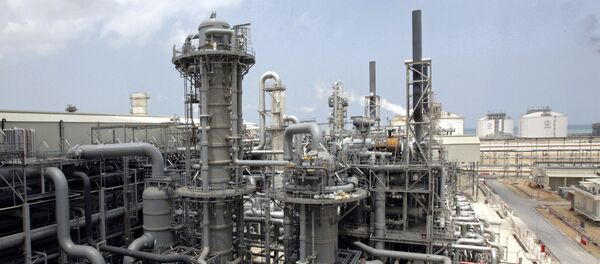Globally, the price of oil has generally been low and falling since 2010. Many major oil nations, which flourished when prices were high, are finding the situation increasingly desperate — in many cases oil exports account for over half their GDP.
Crude Oil Prices — 70 Year Historical Charthttps://t.co/xWcBUSK7tJ pic.twitter.com/XlndW74s4T
— El Guapo Plethora Ⓐ (@OrBVIOUS66) May 5, 2017
Many factors account for the rock-bottom cost of oil barrels in 2017. Chief amongst them is an oversaturated market and an effective oil surfeit. In essence, there's too much oil to sell, and too many sellers to sell it.
In response, Saudi Arabia, the world's biggest oil exporter, has attempted to curb the market and restrict the amount of oil available to boost prices once more.
Putting crude under the hammer is one way of establishing worth. In other fields, such as gold or even classic cars, achieved auction prices have long-been a key determining metric, but the approach is comparatively untested in the energy world. That auctions also allow sellers to flog their oil directly is surely a welcome bonus.
Furthermore, offering up oil for auction by definition opens up the market to a wide range of buyers old and new, granting sellers invaluable market insights — how many buyers there are, how aggressive they're willing to be and what they're willing to pay.
Typically, the commodity is sold via tenders or private negotiations, meaning prospective customers can't outbid an opposing offer even if they are willing to.
Also, firms will be hoping buyers will outbid each other, and boost the value of their oil in the process.
The first adopters of the strategy were Iraq's state Oil Marketing Company SOMO and Malaysia's government-run producer — both have auctioned off cargoes in 2017, via the Dubai Mercantile Exchange (DME).
Under DME guidelines, sellers provide details on the type of crude, quantity, delivery and other specifications such as floor price, date and duration of the auction. The process is conducted via an electronic platform, and doesn't reveal the identity of bidders, but their real-time price offers are available for everyone to see, and outbid.
SOMO completed its first auction on the platform in April, selling two million barrels of Basrah Light grade for June loading. The company has sold four million barrels each of Basrah Light and Basrah Heavy since, with its most-recent sale attracting 17 bidders and 25 bids in a two-minute window. The September-loading heavy cargo was sold at $1.37 a barrel more than the official price, and far faster than traditional methods would ever allow.
Typically, these now seemingly antiquated sales processes can take hours or even days to accomplish. The company has now amended its official selling price accordingly.
Of course, it's not always viable for producers to sell supplies via auctions. Some cargoes from countries such as Kuwait, for example, are restricted in terms of where they can be shipped, meaning buyers would be limited in their ability to transport their purchases.
Moreover, some suppliers also have standards in respect of credit and legal requirements participants cannot meet, and sellers simply may not have the option to auction as they have already committed their volumes under long-term contracts.
Still, there are clear indications that SOMO's positive experience with the model is not an outlier, but a harbinger of things to come, too. In May, Kuwait Petroleum Corporation (KPC) announced it was entering a partnership with international trading houses.
Other state oil giants will surely follow in time.




